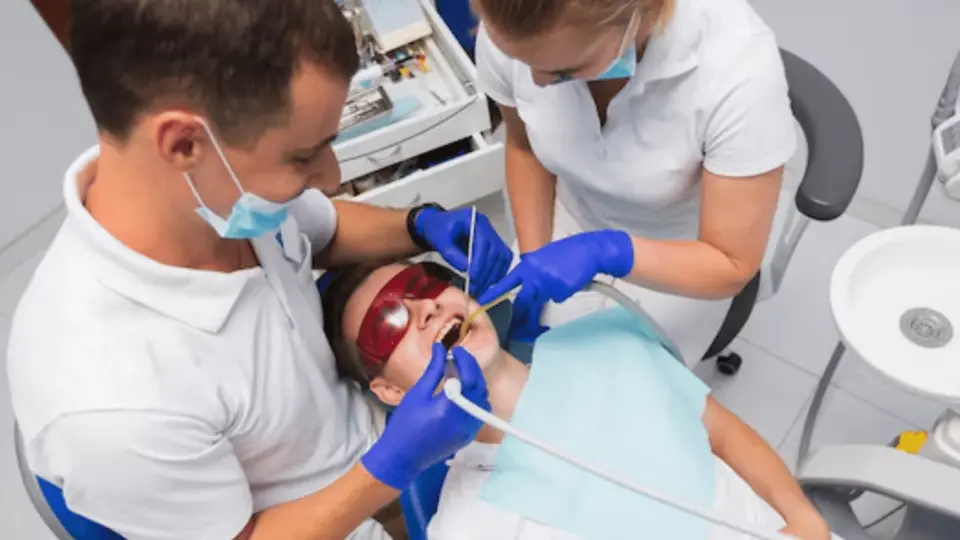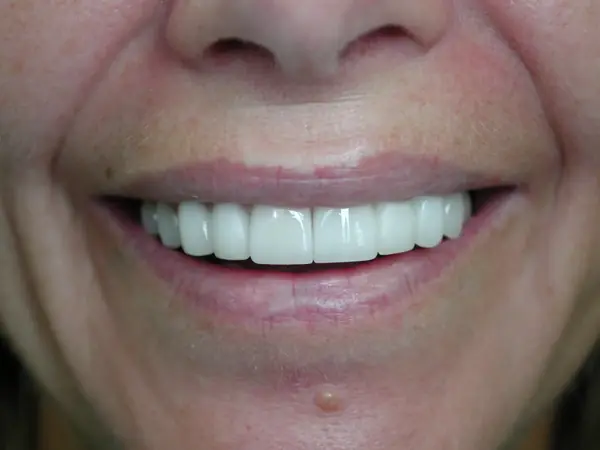A one-hour cleaning can do more for your body than a new mouthwash. That visit doesn’t just polish teeth. It lowers inflammation, reduces bacteria, and gives your immune system fewer fires to fight. Healthy gums seal tight and keep germs out of your blood.
Unhealthy gums leak, which can make heart strain, blood sugar swings, and poor sleep more likely. Your hygienist removes hardened tartar, disrupts the biofilm that fuels gum disease, and checks for early cavities or cracks while they’re simple to fix. You leave with smoother teeth, calmer gums, and a plan that fits your routine and risk.
Space acidic snacks, rinse with water after coffee, and use tools you’ll actually use: a soft brush, floss or a water flosser, and a remineralizing toothpaste if you’re sensitive. Book cleanings on a schedule that matches your mouth, not just the calendar. Short appointments now help you stay healthy for years.
What is The Link Between Gum Disease and Chronic Illnesses?
Gum disease is not only a mouth problem. Gums have many blood vessels, so inflammation and infection can affect the rest of your body.
- In the heart and arteries, inflammation influences plaque formation and stability.
- With diabetes, active gum disease can raise blood sugar. Poor control can also worsen gum disease.
- During pregnancy, moderate to severe gum disease links with higher risks for complications.
- Research continues to study oral inflammation and brain health.
Cleanings interrupt the biofilm that drives gum inflammation. Regular visits keep that bacteria organized less often, which calms the gums and lowers the load on your immune system.
How Can Bacteria From Your Mouth Affect Your Overall Health?
Your mouth holds many types of bacteria. When gums are healthy, your body handles normal exposure well. When gums are inflamed, more bacteria slip into the bloodstream.
Ways this matters:
- Small bursts into the blood: Chewing and brushing can push bacteria into the blood. Healthy gums keep these events small.
- Inflammation signals: Bacteria release substances that amplify inflammation.
- Stubborn biofilm: Tartar is hardened plaque that only a professional can remove. Breaking it up reduces the problem at its source.
- Airway effects: Sore gums can encourage mouth breathing, which dries tissues and may worsen snoring and sleep quality.
Translation: a cleaning does more than polish. It retrains your mouth’s bacteria and lowers unnecessary immune alarms.
What Serious Health Conditions are Connected to Poor Dental Health?
No single factor explains these conditions, but poor oral health can add to the risk.
- Cardiovascular disease: Gum inflammation relates to changes in blood vessel function and higher inflammatory markers.
- Diabetes complications: Treating gum disease can help stabilize blood sugar.
- Respiratory infections: Oral bacteria can be inhaled into the lungs, especially in vulnerable groups.
- Pregnancy concerns: Proactive cleanings and gentle home care support healthier outcomes.
- Cognitive health: Researchers are studying links between chronic oral inflammation and brain health.
- Jaw and muscle tension: Irritated gums and an imbalanced bite can increase clenching and headaches.
Short version: poor dental health invites other problems. Cleanings help keep those problems away.
Is There Scientific Evidence Linking Regular Dental Cleanings to a Longer Life?
There is no single number for “years added,” but the case is strong.
Why regular cleanings support longevity:
- Lower inflammation: Removing tartar and disrupting biofilm reduces bleeding and calms tissues.
- Early fixes: Cleanings help catch small cavities, cracked fillings, and early gum issues while they are simple and less costly.
- Better home care: Regular check-ins improve technique and tools.
- Health habits cluster: People who keep preventive visits often follow other healthy routines.
- Sleep support: Healthy gums and a balanced bite help you sleep better, which supports metabolism, immunity, and heart health.
Cleanings reduce known stressors on the body and prevent crises that derail health. That is a smart path to a longer, steadier life.
How to Turn Cleanings Into a Lifespan Habit
Book the right cadence
- Every six months works for many.
- Every 3 to 4 months fits if you have a history of gum disease, dry mouth, braces, or diabetes.
Say yes to small preventive care
- Sealants, small fillings, and bite adjustments now prevent larger work later.
Upgrade your toolkit
- Soft bristle brush or an electric brush with a pressure sensor
- Floss you will use or a water flosser
- Remineralizing toothpaste if you have sensitivity or early enamel wear
- Xylitol gum after meals when you cannot brush
Protect your mouth’s ecosystem
- Space acidic snacks and drinks
- Rinse with water after coffee, tea, or soda
- Stay hydrated to support saliva
Connect the dots
- Tell your dental team about diabetes, heart disease, autoimmune conditions, pregnancy, or medications that affect saliva.
- Coordinated care multiplies the benefits.
Myth-Busting
“My gums always bleed when I floss. That’s normal.”
Bleeding means inflammation. Cleanings and steady home care reduce bleeding.
“If nothing hurts, I do not need a cleaning.”
Pain comes late. Cleanings prevent pain from starting.
“Rinses can replace cleanings.”
Mouthwash cannot remove tartar. Only a professional can do that.
“I had a deep cleaning once. I am fixed.”
Periodontal therapy starts the recovery. Maintenance visits protect the result.
Schedule Your Dental Cleaning With Us!
If you want cleanings that support your long-term health, we can build a plan that fits your mouth and your routine.
What you get:
- A clear gum health snapshot you can understand
- Thorough biofilm and tartar removal with gentle, modern techniques
- Personalized prevention coaching for diet, tools, saliva, and pH
- Early detection for small issues before they become big ones
- A follow-up schedule tailored to your needs
Schedule your Longevity Cleaning with Jaline Bocuzzi, DMD, PA // JBDentistry and turn a simple appointment into a lasting health habit.


